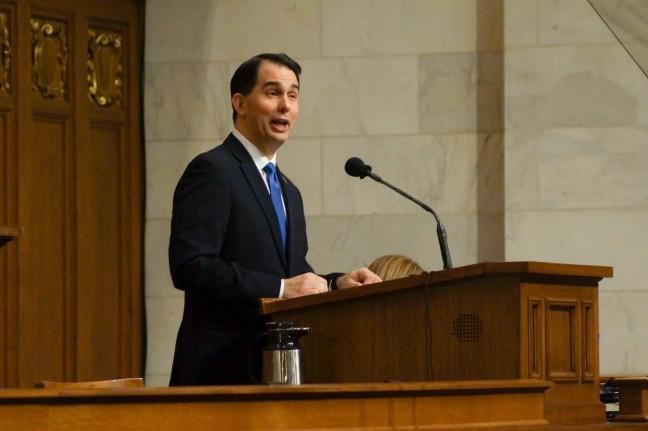Maybe it’s because he is no longer running for president or maybe it’s because the cold weather is syncing up with his cold feelings toward higher education. Regardless, Gov. Scott Walker has recently proposed a slue of new college affordability legislation. The only problem is, it’s not nearly enough.
Walker proposes plan to make college more affordable, but no financial aid increase for UW System
Currently, Walker’s proposal includes creating emergency grants for students who have faced “unexpected expenses” and a required financial literacy seminar for first semester students, and allocates $700,000 to hire internship coordinators. If by “unexpected expenses,” he means the insanely, unconscionably high prices of textbooks, then the proposal would actually do something. If the required financial literacy seminar wasn’t a rip-off bill Republicans refused to move ahead with, I could respect Walker’s originality. Also, if that $700,000 went to funding the University of Wisconsin System directly, it would likely do more good.
Another aspect of Walker’s proposals is an increase of $18.8 million for the Wisconsin Grants program. The Wisconsin Grants program provides need-based grants to technical college students. While $18.8 million going toward helping technical college students is great, what about those at a four-year college or university? On average, technical college students graduate with $10,000 in debt, while four-year students graduate with $26,000 in debt.
The question should not be about who deserves college debt relief more, but instead about how we can help everyone who is in debt from higher education.
When Walker is the one pushing the proposals to make college more affordable, it is hard to not take them with a grain of salt. These proposals are coming from the man who wanted to slash UW System funding and keep a tuition freeze in effect. In keeping both of those in effect, Walker basically forced UW to remove their out of state student tuition cap.
Early on in Walker’s tenure as governor, it had seemed he cared about helping higher education. He showed this by enacting a tuition freeze. He then passed Act 10 which, while taking away what little power the teacher unions had, was supposed to help education overall. Then, Walker decided to slash funding to the UW system, thus changing the perception that he cared about education or higher education.
So how am I, or anyone, supposed to trust Walker with solving the problem of college affordability?
Democrats, last May, in the state Legislature proposed a bill that would have created the Wisconsin Student Loan Refinancing Authority. This legislation would have allowed the new government agency to buy federal and private loans and refinance them at lower rates for college students. Under this bill, the problem of “unexpected expenses” would be addressed by expanding what tuition costs means so that textbooks and school supplies would be included.
Student loan payments would also be deducted from a student’s income taxes, freeing up money to use toward repaying the enormous amounts of debt that college students face upon graduation. The last important aspect of this bill was that colleges would have to provide loan counseling, something that sounds eerily similar to Walker’s required financial literacy seminars.
Wisconsin Legislature should pass bill to refinance college loans
This legislation that would have done a lot of good for hundreds, if not thousands, of college students failed to pass because Republicans refused to vote in favor of it. Now Republicans, lead by a man notorious for hurting higher education, have proposed their own legislation that would provide minimal help to few students.
Many people who argue against legislation that would make higher education more affordable cite the Constitution. Education may not be a right that is spelled out in the Constitution, but is sure as hell is the reason why our country works and is, from time to time, the greatest country in the world.
It’s hard to write that Walker doesn’t care about college affordability after he rolls out a college affordability plan, but for whom does his plan make college affordable? Sure, it is a decent start on a crisis affecting most college students, but there is no telling what Walker’s next move is. He leaves little faith that more, actual, change will come about to help stop the growing crisis of college debt.
Luke Schaetzel ([email protected]) is a sophomore majoring in Journalism and Political Science.














